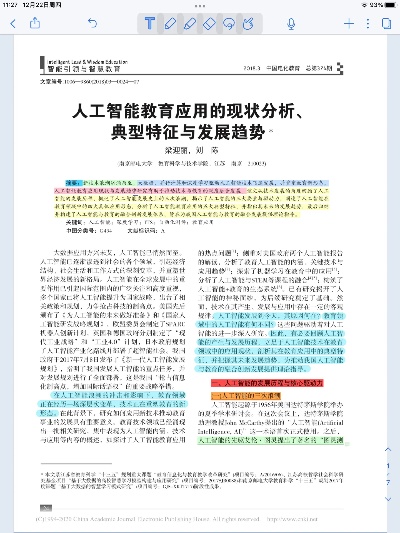Abstract:

Artificial intelligence (AI) is becoming increasingly important in our daily lives. With the rapid development of technology, AI is expected to play a critical role in many industries in the future. This paper explores the potential applications of AI in various fields, and education. The benefits and challenges of AI are also discussed.
Introduction:
Artificial intelligence (AI) refers to the development of computer systems that can perform tasks that usually require human intelligence, such as visual perception, speech recognition, decision-making, and language translation. AI has been widely used in many fields, and education. With the continuous development of technology, the potential applications of AI are expected to increase in the future.
Applications of AI in Healthcare:
Applications of AI in Finance:
AI can also be used in the finance industry to improve customer service and reduce costs. For example, AI can be used to develop chatbots that can answer customers' questions and provide personalized financial advice. AI can also be used to detect fraudulent activities and prevent financial crimes. In addition, AI can help financial institutions analyze large amounts of data to identify patterns and make better investment decisions.
Applications of AI in Transportation:
AI can also play a critical role in the transportation industry. For example, AI can be used to develop self-driving cars, which can reduce traffic accidents and improve transportation efficiency. AI can also be used to optimize transportation routes and reduce fuel consumption. In addition, AI can be used to develop intelligent transportation systems that can improve traffic management and reduce congestion.
Applications of AI in Education:
AI can also be used in the education industry to improve teaching and learning outcomes. For example, AI can be used to develop intelligent tutoring systems that can provide personalized learning experiences for students. AI can also be used to analyze student data to identify learning gaps and provide targeted interventions. In addition, AI can be used to develop educational games and simulations that can make learning more engaging and fun.
Benefits and Challenges of AI:
The potential applications of AI are promising, but there are also challenges that need to be addressed. One of the main challenges is the ethical and social implications of AI. For example, AI can be used to make decisions that have a significant impact on people's lives, such as hiring decisions and loan approvals. It is important to ensure that AI is used in a fair and transparent manner. In addition, there are concerns about the potential job displacement caused by AI. It is important to develop policies and programs to help people transition to new jobs and acquire new skills.
Conclusion:
AI has great potential in many industries, and education. The benefits of AI are numerous, but there are also challenges that need to be addressed. It is important to ensure that AI is used in a fair and transparent manner and that policies and programs are developed to address the potential job displacement caused by AI. The future of AI is promising, and it is important to continue to explore its potential applications and address the challenges that come with it.

